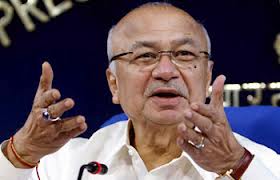
New Delhi, Feb 20: In the wake of BJP's protests over his Hindu terror remark, home minister Sushilkumar Shinde is likely to talk to senior party leader Sushma Swaraj to find a way out to ensure smooth functioning of Parliament during the Budget session beginning on Thursday.
"The BJP wants an apology from home minister Sushilkumar Shinde over his Hindu terror remarks for smooth functioning of Parliament," Sushma Swaraj said. Union ministers Kamal Nath and Shinde also held consultations with Sushma Swaraj to resolve stalemate over the Hindu terror remarks.
Sources said Shinde has conveyed to Swaraj, the Leader of the Opposition in the Lok Sabha, that he will talk to her to find a way out on the saffron terror issue to ensure smooth functioning of Parliament.
"Both sides will make efforts to find a way out for the house to function," BJP veteran LK Advani said after the all-party meeting convened by Speaker Meira Kumar ahead of the Budget Session.
Several BJP leaders were detained today when they sought to take out a march to protest Sushilkumar Shinde's remarks linking the BJP and RSS with terrorism.
Bharatiya Janata Party president Rajnath Singh and colleagues Arun Jaitley, M Venkaiah Naidu and Ananth Kumar were detained along with a mass of supporters at Jantar Mantar in the heart of the capital.
"We cannot allow such a huge crowd to march. We are detaining you here," announced a Delhi Police official.
Addressing the gathering earlier, Rajnath Singh asked Shinde to apologize for his remark made at a meeting of the Congress party in Jaipur.
Rajnath Singh said: "Terrorism has no colour. It is neither Hindu nor Muslim. Why is the Congress trying to divide it on the basis of caste and religion?"
Earlier in the day, Lok Sabha Speaker Meira Kumar on Wednesday held an all-party meeting to ensure smooth functioning of Parliament where opposition is set to target government on issues like corruption in defence deals.
Besides Kumar, the meeting was attended by Deputy Speaker Karia Munda, Leader of Lok Sabha and home minister Sushilkumar Shinde, and Parliamentary Affairs Minister Kamal Nath.
BJP leader LK Advani, Leader of the Opposition in Lok Sabha Sushma Swaraj, NDA convenor and JD(U) leader Sharad Yadav and Samajwadi Party MP Neeraj Shekhar were among the leaders from various political parties who attend the meeting.
Leaders from UPA ally NCP and outside supporter of the government BSP were conspicuous by their absent.
BJP has said that it will raise the chopper scam and the remarks of Shinde on Hindu terror in Parliament.
During the meeting, Sharad Yadav raised the issue of frequent disruptions of parliamentary proceedings. "I have requested the Speaker and others to ensure smooth functioning of the House...the attitude which has developed in the last eight years of not letting the House function should end," he told reporters here.
He said there should be a proper probe and a detailed debate on scams, especially the one relating to kickbacks involved in the purchase of helicopters for VVIP transportation.
Yadav said he would demand debate on the land bill and rising prices during the Budget Session.





Comments
Add new comment